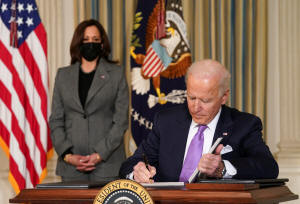In early action, Biden tries to make good on pledge to heal America's
racial divide
 Send a link to a friend
Send a link to a friend
 [January 27, 2021]
By Sarah N. Lynch and Trevor Hunnicutt [January 27, 2021]
By Sarah N. Lynch and Trevor Hunnicutt
WASHINGTON (Reuters) - President Joe Biden
on Tuesday issued a firm call to heal America's racial divide, taking
several steps and promising more to confront racism and inequality that
he said has plagued the United States for far too long.
Racial tensions simmered during the turbulent four-year presidency of
Donald Trump and in issuing several executive orders, Biden noted that
the Jan. 6 siege of the U.S. Capitol by Trump supporters was carried out
by "thugs, insurrectionists, political extremists and white
supremacists."
But Biden said he believes the vast majority of Americans believe in
equality.
"We've never fully lived up to the founding principles of this nation -
to state the obvious - that all people are created equal and have a
right to be treated equally throughout their lives," Biden said in
remarks at the White House. "And it's time to act now, not only because
it's the right thing to do, but because if we do we'll all be better off
for it."

Biden took executive action on four fronts: curbing the U.S.
government's use of private prisons, bolstering anti-discrimination
enforcement in housing, underscoring a commitment to Native American
tribal sovereignty and condemning discrimination against Asian Americans
and Americans of Pacific Island descent he said has risen during the
COVID-19 pandemic.
The Democratic president has sought to roll back some of the policies of
his Republican predecessor and deliver on racial justice reforms he
promised during the election campaign.
Biden and other critics accused Trump of pursuing policies built around
"white grievance" in a nation where the white population is declining by
percentage.
But Biden drew criticism from some Republicans when he used his
inaugural address last week to decry white supremacy and political
extremism.“If you read his speech and listen to it carefully, much of it
is thinly veiled innuendo calling us white supremacists, calling us
racists, calling us every name in the book,” U.S. Senator Rand Paul told
Fox News last week.
Black voters proved essential to Biden first in winning his party's
presidential nomination and then in defeating Trump in the Nov. 3
election.
The United States, still struggling with the legacy of slavery, was
rocked by protests against racism and police brutality in many cities
last year in response to incidents including the death of Black man
George Floyd in Minneapolis police custody in May 2020.
Trump condemned those protests and attempted to use them to stoke fear
and unease among voters during the presidential campaign.
On the day he took office last week, Biden signed an executive order
establishing a government-wide initiative to address racial inequity and
systemic racism in federal policies, laws and programs.
Biden drew criticism from some Republicans when he used his inaugural
address to decry white supremacy and political extremism.“If you read
his speech and listen to it carefully, much of it is thinly veiled
innuendo calling us white supremacists, calling us racists, calling us
every name in the book,” Senator Rand Paul told Fox News last week.
[to top of second column]
|

Vice President Kamala Harris watches as President Joe Biden signs
executive orders on his racial equity agenda at the White House in
Washington, U.S., January 26, 2021. REUTERS/Kevin Lamarque

'I PROMISE YOU'
On Tuesday, Biden said in the coming weeks he would reaffirm a
federal "commitment to diversity, equity and inclusion and
accessibility."
"Again, I'm not promising we can end it tomorrow, but I promise you
we're going to continue to make progress to eliminate systemic
racism, and every branch of the White House and the federal
government is going to be part of that effort," Biden said.
Interest groups as diverse as the American Civil Liberties Union and
the U.S. Chamber of Commerce praised Biden's moves.
Biden said his order directing the Justice Department not to renew
its contracts with privately operated criminal detention facilities
is intended to ultimately end the department's use of private
prisons.
The order did not address contracts for private prisons by the
Department of Homeland Security, which uses such facilities to
detain immigrants who are in the country illegally.
Biden described the move as the first step to "stop corporations
from profiting" from the incarceration of inmates, and said it was
just the start of his administration's plan to address systemic
problems in the criminal justice system.
Biden called for restoring and expanding the landmark Voting Rights
Act even as many states pursue Republican-backed measures that
Democrats have said are intended to suppress voting rights.

After losing the election, Trump made repeated and false claims of
widespread voting fraud and irregularities as part of his failed
effort to overturn Biden's victory.
The Biden administration's newly announced fair-housing policy will
require the Department of Housing and Urban Development to study and
counteract the racially discriminatory impacts of previous policies.
"Housing is a right in America and home ownership is an essential
tool to wealth creation and to be passed down to generations," Biden
said.
(Reporting by Sarah N. Lynch and Trevor Hunnicutt; Additional
reporting by Mike Stone, Ted Hesson and David Shephardson; Writing
by Will Dunham and Sarah N. Lynch; Editing by Will Dunham, Heather
Timmons and Alistair Bell)
[© 2021 Thomson Reuters. All rights
reserved.] Copyright 2021 Reuters. All rights reserved. This material may not be published,
broadcast, rewritten or redistributed.
Thompson Reuters is solely responsible for this content. |